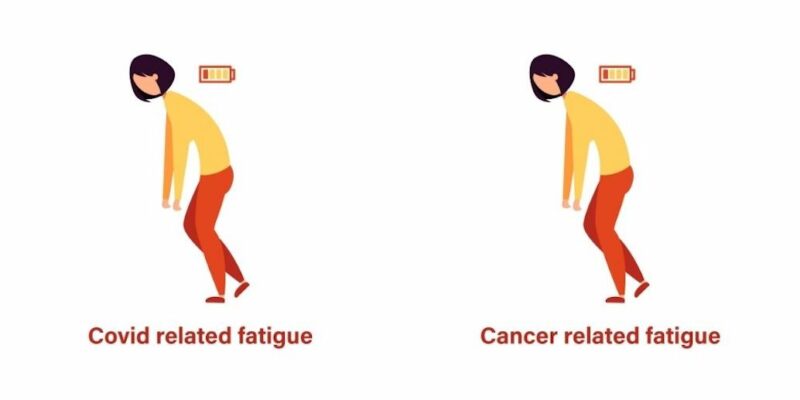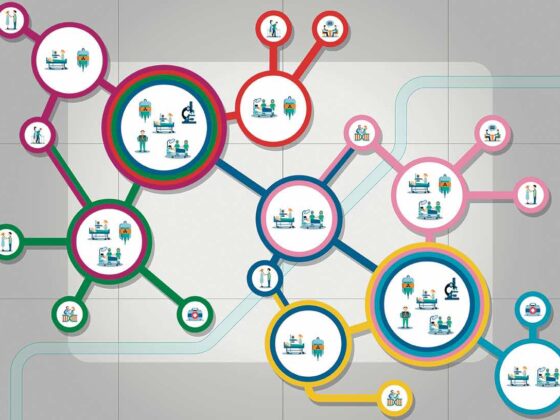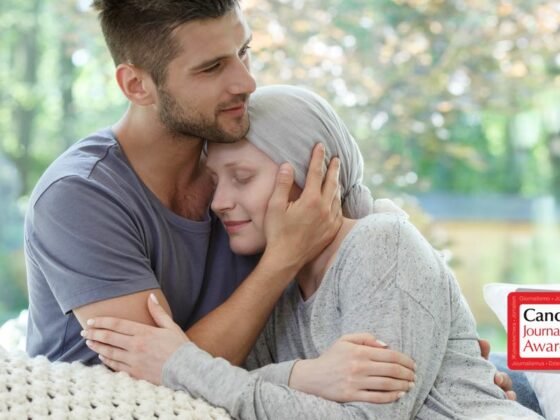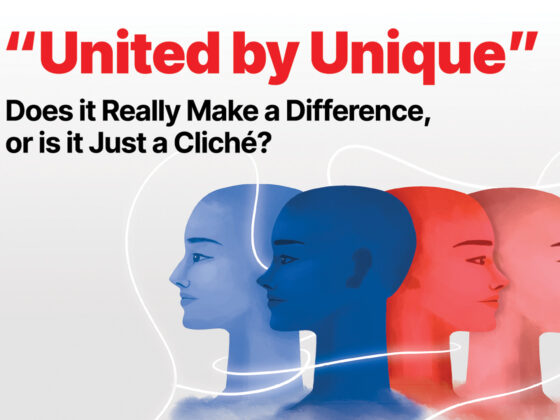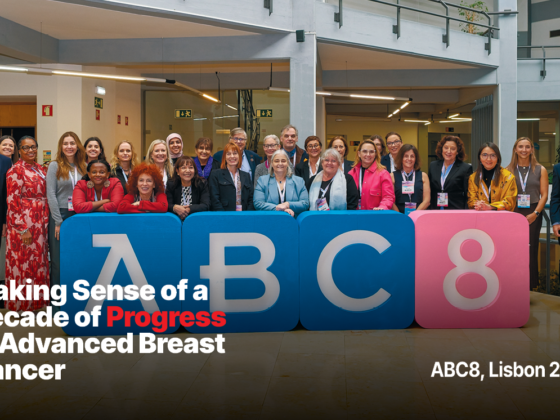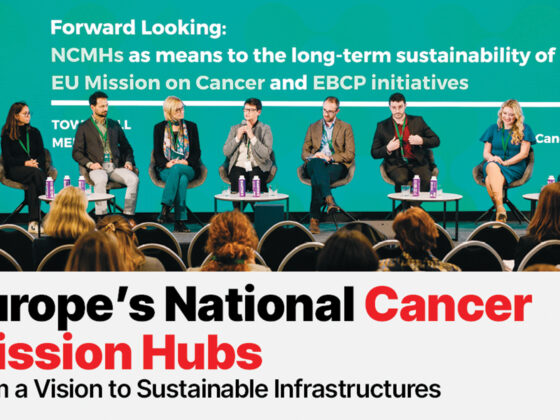Long-term emotionally and physically debilitating fatigue is a fact of daily life for many who have had cancer. Awareness is low, causes mysterious, and physicians are often sceptical or plead powerlessness – even though a growing body of research attests to its prevalence and devastating effect on quality of life.
One study indicated that up to three-quarters of prostate cancer patients experience fatigue, and another study, published in 2020, showed that fatigue levels are “significantly higher” than the general population in patients across 15 cancer types.
Groups representing cancer patients and other people who suffer from chronic fatigue are therefore following with interest all the attention and research funding that long-term fatigue and other symptoms associated with Covid-19 infection are now attracting.
According to André Deschamps, Chairman of the Europa Uomo prostate cancer patient coalition, one of the most striking findings of the coalition’s recent EUPROMS quality of life study is that long-term discomfort, tiredness, and insomnia have such a strong influence on the quality of men’s lives after treatment.
“These important areas do not receive sufficient attention from physicians, support services and researchers,” he says. “Yet the significant effects that post-Covid fatigue can have on people are now being well-publicised and recognised.”
In the UK, for example, where in May 2021 one million people reported they were experiencing sustained symptoms following Covid, the Government announced that 15 new studies will investigate what is now becoming known as ‘long-Covid’. This research, they said, will “support thousands of vulnerable people, backed by nearly £20 million through the NIHR [National Institute for Health Research]”. In February, the World Health Organization Director for Europe called on all countries and institutions in Europe to come together “as part of an integrated research agenda,” on post-Covid conditions “using harmonized data-collection tools and study protocols”.
So the question now being raised is: will the flood of attention, research and funding being directed towards the devastating effects of long-Covid finally throw the spotlight onto causes and cures for other fatigue syndromes such as cancer-related fatigue?
Martina Schmidt from the German Cancer Research Centre certainly hopes so.
“Fatigue can be one of the most burdensome symptoms for cancer survivors, and about a quarter of cancer survivors experience it long term,” says Schmidt, a senior scientist who over ten years has researched widely into quality-of-life issues for people with cancer, during and after treatment.
In a large survey of more than 2,500 cancer survivors conducted by Deutsches Krebsforschungszentrum (German Cancer Research Centre), almost six in ten respondents reported that they lacked good information about fatigue, and more than four in ten reported that their treating physician had never asked them whether they were fatigued.
“There needs to be a change,” she says. “Physicians, healthcare providers and insurance companies do not address it, and families and friends aren’t always understanding because they want to think the cancer is cured. It’s really a burden.”
They are intrigued by similarities with the fatigue
associated with long-Covid
Last year, her team published their research looking at fatigue across 15 cancer types, and found that age- and sex-standardised physical fatigue prevalence ranged from just over 30% among prostate cancer patients to more than 50% among liver cancer patients. They are intrigued by similarities with the fatigue associated with long-Covid. But they are also aware that the term ‘fatigue’ is very general, covering many different conditions and causes.
Not all chronic fatigue is the same
“We need to make distinctions,” says Schmidt. “Chronic fatigue syndrome (CFS), for example, may have similar symptoms to cancer-related fatigue, but also has other physical issues such as sore throat, muscle pain, and exercise intolerance, and it often seems to be associated with viral infection. It might be that fatigue after Covid is more related to CFS: I think this is still not clear. But even so, there are likely to be overlaps.”
She points out that the fatigue of long-Covid is often associated with depressive, sleep, and cognitive symptoms – all also associated with fatigue after cancer treatment. The immune system and inflammation processes might be involved in the different fatigue syndromes.
The important thing, says Schmidt, is that there is growing attention on fatigue in general. “We need people to consider fatigue in terms of its different causes, biological mechanisms, and manifestations. That may help us get a better understanding of how it can be effectively treated.”
Umberto Tirelli, senior visiting scientist and former Oncology Chief at the Oncology Referral Centre at Aviano, Italy, and a specialist in chronic fatigue, is among the scientists who believe that there may be pathological links between what we call cancer-related fatigue and what we call long-Covid. But like Schmidt, he believes it is important to draw lines and make distinctions wherever possible.
“I think that the research that is now being conducted into long-term fatigue symptoms after Covid-19 might have relevance for the world of cancer,” says Tirelli, who is Director of the Clinica Tirelli Medical Group, which specialises in cancer, chronic fatigue, Covid-19, and preventive medicine. He believes that there are important distinctions to be made within both cancer-related fatigue, and post-Covid fatigue.
Two types of fatigue might be being experienced by cancer patients. Some will be experiencing fatigue as a direct result of the cancer and its treatments: there may be different underlying causes including anaemia, endocrine and metabolic disorders, and cardiovascular and renal dysfunction. Others, he believes, may be experiencing a particular type of fatigue similar to that experienced by people with chronic fatigue syndrome (CFS) or myalgic encephalomyelitis (ME), with symptoms including: severe fatigue associated with memory and concentration problems, lasting tiredness after exercise, muscle and joint pain, headaches, and unrefreshed sleep. This kind of cancer-related fatigue could be considered a sub-type of CFS, says Tirelli.
“This kind of cancer-related fatigue for me is an illness in those cured of their cancer and unrelated to metastatic disease or ongoing cancer drugs. It is similar to CFS/ME, possibly due to immunological abnormalities.”
Interestingly, he also believes there are two types of long-Covid sufferers, along similar lines. One group is suffering fatigue as a result of long-term damage to lungs, heart, liver, kidneys or brain as a result of Covid infection. The other is suffering debilitating symptoms such as tiredness and lack of concentration, even though there is no organ damage, and this second condition again has many similarities to CFS/ME.
The overlap suggests that investigating the causes of long-Covid has the potential to throw light on cancer-related fatigue
The overlap suggests that thoroughly investigating the causes of long-COVID has the potential to throw light on both CFS/ME and cancer-related fatigue. There is already some evidence that CFS/ME is linked to issues in energy metabolism, nervous function, and immune response, says Tirelli.
Who will fund research across disease areas?
But is such wide-ranging research likely to take place, and how successful is it likely to be?
So far, one of the leading UK research projects has been a twins study at King’s College London, which has used the COVID Symptom Study app to examine long-lasting symptoms, using volunteer questionnaires to try to define post-Covid syndrome, while also tracking blood markers to shed light on the immune mechanisms that might contribute to long-term symptoms. Its work has been supported by European as well as UK funds.
In June 2021, based on early findings, the researchers proposed a new model for identifying individuals at risk of long-Covid for trials investigating prevention and treatment. In parallel, King’s College researchers are also investigating potential triggers to changes in immune activity in CFS, particularly the role of cytokines (proteins involved in regulating the immune system).
According to Frances Williams, from the Department of Twin Research and Genetic Epidemiology at King’s, there are links between all these strands of work. But funding tends to be focused on particular discrete research questions, rather than exploring larger questions such as connections between fatigue syndromes.
“It’s exactly the sort of research we are keen to do,” she says. “There’s already some controversy over whether you can draw parallels between what we call long-Covid and post-viral fatigue, and it’s a contentious area. But in order to sort out the science in contentious areas, we need some funding to do some really well-designed studies across all areas.
“What I would like to do would be to collect some cancer patients, some radiotherapy patients, some chemotherapy patients, some post-viral patients, some inflammatory arthritis patients and some post-Covid patients and really study them in depth to find out whether there are similarities or differences and what the mechanisms in each of these conditions is. That requires very big scale funding, and we don’t have that at present. We do, however, have funding to do some very Covid-specific work.”
“It is highly plausible that long-term cytokine response is at the root of all these fatigue syndromes”
One of the potentially common areas that certainly needs further investigation is the role of immune proteins such as cytokines. “Clearly one of the theories about cancer-related fatigue is that it isn’t necessarily the treatment that is causal, but a long-term cytokine response to treatment. I think it is highly plausible that this is at the root of all these fatigue syndromes.
“It is certainly clear that it is often a cytokine storm that means Covid patients require intensive care. This is something we are investigating in our twins studies, examining those who generally remain out of hospital with Covid. We had already collected lots of information about their immune systems before Covid struck, so that put us in a very strong position for trying to identify biomarkers that predict who will do badly after Covid infection. We can look at the cytokines they had circulating in their blood five to ten years ago, to see if any predict the long-term response to Covid.”
So for those with an interest in cancer-related fatigue, the big question now is whether the urgent need to better understand long-Covid will prompt broader efforts to join the dots on fatigue more generally.
It’s a possibility that there will now be a new impetus for wider research,” says Frances Williams. “But in the end it comes down to politics,” she says. “Large amounts of funding have been made available for post-Covid fatigue because it is uppermost in everybody’s minds, but it hasn’t been joined up with an overwhelming requirement to understand fatigue in general, which affects many people in different parts of the healthcare system.”
Definitions
What is long-Covid?
Definitions of long-Covid have been issued by both the British National Institute for Health and Care Excellence (NICE) and the National Institutes of Health in the United States.
The NICE definition explains post-Covid-19 syndrome as:
- Signs and symptoms that develop during or after an infection consistent with Covid-19, continue for more than 12 weeks, and are not explained by an alternative diagnosis.
- Usually presents with clusters of symptoms, often overlapping, which can fluctuate and change over time and can affect any system in the body
Symptoms include:
- psychiatric problems
- generalised pain
- fatigue
- persisting fever
What is cancer-related fatigue?
The European Society for Medical Oncology (ESMO) published practice guidelines on cancer-related fatigue in 2020, and said it was characterised by:
- A distressing, persistent, subjective sense of physical, emotional and/or cognitive tiredness or exhaustion that is not proportional to recent physical activity and that interferes with usual functioning.
- Its severity and persistence compared to other types of fatigue, and the inability to alleviate it through rest or sleep.

